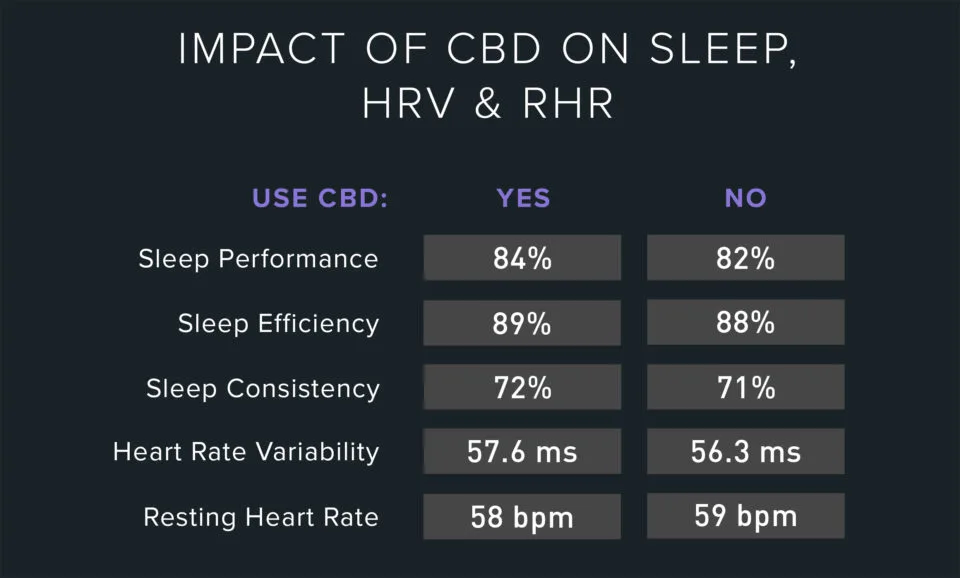Topics
- Article
- Behavior Impact
- Sleep
How Taking CBD Affects Sleep, Resting Heart Rate, HRV & Recovery

We discuss what CBD is, explore when and how often WHOOP members track using it, and examine its effects on sleep, resting heart rate, HRV, and recovery.
Use of CBD is one of many choices and behaviors you can track via the WHOOP Journal in order to better understand what impacts your physiological data. An analysis of journal responses from our members found that taking CBD leads to mild improvements in multiple sleep metrics.
What is CBD?
CBD is an abbreviation for cannabidiol, which is a naturally occurring chemical compound. It comes from the Cannabid sativa plant, more commonly known as marijuana. CBD does not contain tetrahydrocannabinol, or THC, the psychoactive component of marijuana that makes you “high.” Common uses for CBD include pain relief, to curb anxiety or feel more calm and relaxed, and to help with sleep.
When and How Often Do WHOOP Members Track Using CBD?
For this analysis we looked at the anonymized data of WHOOP members who log using CBD on a regular basis (10 or more journal entries over the past 90 days). We learned that 10.1% of female members actively track CBD, and 8.5% of male members. In addition to it being more common with female members, we also found it to be more popular among older members. Of the roughly 9% of members who track CBD, there’s a 28.5% chance they will answer “yes” in the journal to using it on any given day. However, the average frequency of “yes” responses increases significantly with age: 20-29: 23.5% 30-39: 27.7% 40-49: 32.2% 50-59: 33.8% For example, 20-29 year olds who track CBD on average use it about once or twice per week, while 50-59 year olds use it closer to 2-3 times a week. As with marijuana, April is the most common month for CBD use, with members who track it logging it on 31.8% of all days. However, unlike marijuana, which we saw has the highest usage rates on the weekends (implying recreationally), our members are most likely to use CBD during the week (on Mondays, Tuesdays, Wednesdays, and Thursdays in that order), suggesting its intention is to aid performance, recovery, sleep, etc. That brings us back to the main question, does CBD actually help your sleep?
READ MORE: Impact of Marijuana on Sleep, Resting Heart Rate & HRV
How CBD Affects Sleep, Resting Heart Rate, HRV & Recovery
The changes are minor, but the data shows WHOOP members have better sleep efficiency and sleep consistency when they report using CBD. Additionally, their average sleep performance (the percentage of sleep they get compared to their sleep need) increases from 82% to 84% after logging CBD use.

WE FOUND CBD USE to have modest benefits on several SLEEP metrics, as well as RESTING HEART RATE & HRV.
CBD also has a slight positive effect on WHOOP members' resting heart rate and heart rate variability, with average HRV rising by 1.3 milliseconds and average RHR dropping by 1 beat per minute. And while the difference is negligible, next-day recovery is 0.22% higher on average.
See What Else Impacts Your WHOOP Data
The WHOOP Journal offers a great variety of options for things you can track, ranging from eating a late meal before bed, to feeling stressed during the day. You can then learn how these choices and behaviors affect your daily recovery and other WHOOP data from your Monthly Performance Assessments and in-app insights.